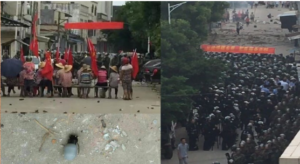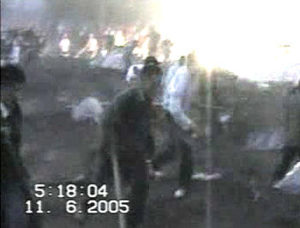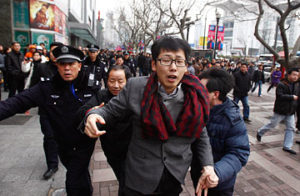 Actually, peasant protests in China are no more a portent of political revolution than worker strikes in America are.
Actually, peasant protests in China are no more a portent of political revolution than worker strikes in America are.
Chinese police fired rubber bullets at villagers and arrested 13 people on Tuesday in an overnight crackdown to suppress demonstrations in a southern fishing village that became internationally known five years ago for protesting land seizures. Police stormed into the village of Wukan in the southern province of Guangdong and arrested leaders of ongoing demonstrations in their homes.
‘The whole of Wukan village is under siege from police,’ one female resident, who declined to give her name, told the Guardian.
(London Guardian, September 13, 2016)
The media reported this protest and crackdown as breaking news. Except that similar protests have been erupting every day for decades – not just in Wukan but in villages across China.
In fact, a similar protest and much deadlier crackdown in Dongzhou eleven years ago moved me to write “Gap Between Rich and Poor in China Is Sowing Seeds of Resentment and Terminal Unrest,” December 22, 2005. Here is an excerpt.
__________________
The irony is that the great proletarian revolution Karl Marx predicted for capitalist societies is brewing in communist China. Specifically, urban sprawl is supplanting rural areas and further alienating poor farmers (who have seen only hardship from this economic boom). These simmering tensions between the ‘haves’ and the ‘have-nots’ will inevitably cause China to implode.
 Images depicting village riots, which are erupting all over China, must be taken surreptitiously. Because, even though they allow more freedom of commerce these days, Chinese leaders still forbid freedom of the press.
Images depicting village riots, which are erupting all over China, must be taken surreptitiously. Because, even though they allow more freedom of commerce these days, Chinese leaders still forbid freedom of the press.
Yet one can get a sense of these simmering tensions from reports by China’s own ministry of propaganda. For it confirmed earlier this year that the ‘number of riots has risen sharply in China, reaching more than 70,000 in 2004 and developing into a major concern for the government.’
_________________
Frankly, the only thing that has changed since then is that social media have enabled protesters to share their perennial plight in more vivid and moving color … and in real time.
 Still, my hope for democratic change in China remained such that I harbored delusions of a Chinese Spring doing across China what the Arab Spring was doing across the Middle East.
Still, my hope for democratic change in China remained such that I harbored delusions of a Chinese Spring doing across China what the Arab Spring was doing across the Middle East.
As everyone from Mubarak to Gaddafi found out, once people overcome the fear of oppression, it’s only a matter of time before they are willing to kill (or die) for their freedom.
Of course, the sheer number of disenfranchised and dispossessed people affected makes it prohibitive even for the amoral Communist Party to emulate either the Syrian regime by crushing them militarily or the Saudi regime by placating them financially.
This means that, instead of the mass non-violent democracy protest that was so easily crushed in 1989, Tiananmen Square 2.0 is bound to be a bona fide, bloody revolution. Which makes the allusion to Jasmine seem like a macabre joke….
(“Jasmine Revolution Simmering in China,” The iPINIONS Journal, January 19, 2012)
But it turns out that, unlike the Tiananmen protesters, these peasant protesters are not yearning for democratic freedoms. They just want land rights, cleaner air, and, ironically, less of the corrupt governance that has attended introduction of Western-style capitalism throughout their villages.
I failed to appreciate this; the media failed to report it.
 Which is why, despite protests rising to as many as 200,000 a year (or over 500 every day), reports about them portending doom for Communist Party rule are greatly exaggerated.
Which is why, despite protests rising to as many as 200,000 a year (or over 500 every day), reports about them portending doom for Communist Party rule are greatly exaggerated.
China is clearly exploiting the tenets of capitalism that give rise to the wealth of nations. But it is retaining its totalitarian form of government, which controls the means of production. This makes Chinese-style capitalism formidably barren when it comes to the seeds of destruction Marx warned about.
In any event, like its democracy protesters, China’s peasant protesters are unlikely to ever get what they want. The only silver lining is that more of them are surviving their protests.
Related commentaries:
Gap between rich and poor…
Jasmine revolution…